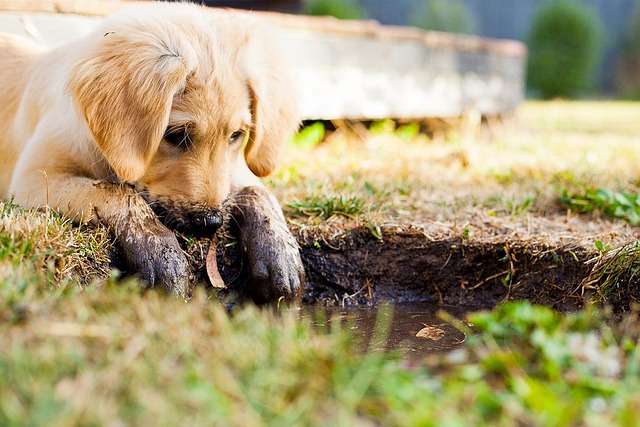Are you thinking about getting your first puppy? If so, you’re in for a lot of fun! Owning a puppy is a big responsibility, but it is honestly also a lot of fun. In this guide, we will walk you through everything you need to know before bringing your new furry friend home. We’ll cover topics such as preparing your home for a puppy, training tips, what to expect during the first few weeks, and more!

Prepare Your Home
First and foremost, be sure your home is in order. We recommend establishing a separate “dog zone” for the dog’s crate, bed, and toys. You may need to set up some baby gates depending on the size of your property and whether particular rooms will be “off limits.”
Keep electrical cords out of reach and covered or secured.
Puppy-proof cupboards or bedrooms are a good place to store chewables, shoes, and other edible delights.
Prepare family and friends to embrace their new canine companion. Prepare people to welcome your new puppy by first teaching them how to socialize it with strangers. Seek to find out if dogs are permitted, and whether or not they would be able to protect your home. If you decide to keep a dog at home, have a family meeting and make sure everyone is on the same page about dog care and consistent training.
Gather Supplies—But Not Too Many!
It might be difficult to know where to begin when there are so many dog products accessible. There may appear to be a million options for new pet parents, from basic items like a leash and collar to enjoyable things like snacks and games!
The following are the most crucial dog supplies to buy up front:
- Collar and leash
- Bags for feces
- If you’re going to crate train your dog, a dog bed and an appropriate-sized cage are required.
- Water and food dishes
Requirements for Your Puppy’s Diet: If your puppy is new to the shelter or bred, their diet may be especially important. You must feed him or her high-quality dog food (the shelter or breeder should provide you with a starter portion of food so you can).
Gradually move your dog to a manufacturer of his or her choice. Learn everything about how to pick the best food for your dog in our guide on dog foods).
What do you get your new dog as a gift? It is dependent on the dog! Some dogs take to tennis balls right away, while others become obsessed with chew toys. Some dogs are driven by treats and will do anything for a biscuit, while others desire only the stinkiest, meatiest treat.
It’s tempting to buy your new dog as many toys and snacks as possible, but it’s typically a good idea to get to know them before investing a lot of money. Begin with a few different types of toys, and add more as you learn what your dog enjoys.
Find a Veterinarian

It may be one of the most frightening aspects of starting pet parenthood, but it doesn’t have to be. We recommend finding a vet before you get your new dog so you’ll be prepared from the beginning.
The best method to locate a veterinarian is through a combination of research and word-of-mouth. Inquire about veterinarians’ expertise and bedside manner on social media sites like Facebook, where you can also post your own personal experiences. Our article on selecting a veterinarian can assist you in making the best selection for your dog.
When your new puppy or dog comes into your home, schedule a “getting to know you” vet appointment to get them acclimated with the place and people. It’s also a good idea to start building a relationship with the veterinarian as soon as possible, especially if your dog doesn’t require immediate medical care.
House Training
Even if you’ve acquired an adult dog or adopted a new puppy, you’ll want to put together a house training strategy. Even properly trained dogs may need additional lessons in a new setting.
Here’s a quick rundown of how to house-train your dog or puppy:
Make a plan. A constant feeding regimen will result in a regular elimination routine. Puppies can “hold it” for one hour for each month of life in general. Adult dogs may go longer, but they might do better with a restroom break every three to five hours.
Choose a cue phrase. “Go potty” is often used, but there are alternatives! Initially, take your dog to the chosen toilet location every time you go out. This will aid in the connection of the cue with the activity and placement.
Above all, be patient when it comes to house training a new canine family member. You’ve got this.
Obedience Training
We can’t emphasize enough how important it is to enroll your dog in a training class. It’s not simply about obedience; it’s also one of the greatest ways to get to know your dog.
Taking an obedience course at your local animal shelter or training center is the ideal approach for a new dog parent to learn about their puppy and canine behavior in general. Consider it Puppy 101, a one-stop resource for getting to know your new pet.
In basic obedience class, you’ll learn a few fundamental skills:
- Sit
- Down
- Stay
- Come
- Loose-leash walking
It’s not necessary to take the most difficult training classes to start with. After you’ve mastered the basics, you may continue taking more advanced courses and working from home to build your skills and obedience. Learning to trust and listen to one another can be a lot of fun, especially if you enjoy training your dog!

